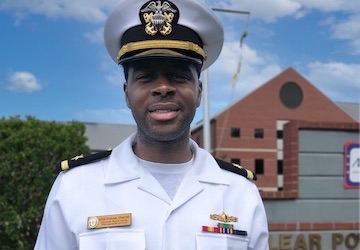National Engineers Week
National Engineers Week Highlight: Dimitri Foster
 Dimitri Foster had always been fascinated with the universe: wondering why and how
things worked. “After learning in my high school chemistry class that everything in
the universe is composed of different configurations of elements, I was sure this
was what I wanted to study,” he recalled.
Dimitri Foster had always been fascinated with the universe: wondering why and how
things worked. “After learning in my high school chemistry class that everything in
the universe is composed of different configurations of elements, I was sure this
was what I wanted to study,” he recalled.
A passing comment by his high school chemistry teacher at the John Jay Secondary School for Law in Red Hook, Brooklyn, changed the trajectory of Dimitri Foster’s life. “My chemistry teacher, Ms. Barrett, saw something in me. She said I should become a chemical engineer —we need more Black chemical engineers.”
“I honestly did not know what it would entail. Growing up, I didn't have anyone to look up to in order to know what I wanted to be in life. When she said to become a chemical engineer, it was the first time I decided I would focus on doing something and follow through. She believed in me, so I knew I could do it – and I did,” Foster explained.
The former Brownsville resident graduated from Kingsborough Community College in 2010 with an associate degree in engineering science and then transferred to CUNY’s City College of New York, where he earned a bachelor’s in chemical engineering.
Fast forward 10 years and the engineering graduate is now a lieutenant junior grade (O-2) in the U.S. Navy.
He currently serves on the USS Ronald Reagan CVN 76 out of Yokosuka, Japan, on the only forward-deployed nuclear-powered aircraft carrier.
“I am a Navy nuclear propulsion officer, also known as a surface warfare officer (nuclear), in the chemistry and radiological department. We’re responsible for the Reactor Laboratories division,” noted Foster, whose job requires a high level of knowledge of the A4W nuclear reactor. “My division maintains chemistry in the specification to operate the nuclear reactor safely. We also make ensure radiation levels are maintained to ensure personnel safety, and provide propulsion and steam for our jets to launch.” He also needs to be ready to make split-second decisions in case of a casualty during war.
“What I love most about my job is that every day presents a different challenge. I am responsible for 30 sailors in my division. So, whether it’s personnel issues, or chemistry and radiological issues or paperwork, there is always a different skill set that I need to access,” he offered. “Plus, how many people can say that they operated a nuclear reactor on a nuclear aircraft carrier out of Japan?”
Ironically, while attending the Navy’s Officer Candidate School in 2017, the naval officer could barely swim. “To become a commissioned officer, I had to learn one stroke to complete the 3rd class swim qualification. I was afraid of drowning,” he shared.
Two years later, to complete the 2nd class swim qualification — required to become a small boat officer, which is a pre-requisite to becoming a surface warfare officer — he needed to perform four different strokes and prone-float for five minutes. “I practiced almost every day and whenever I had free time to learn all the strokes. It took a lot of mental toughness but I overcame that fear. Now, I love to swim!”
Looking forward, Foster hopes to earn an MBA at an Ivy League college, start his own chemical distribution/technology business, have two kids, and travel to as many different countries as possible.
His advice to someone just starting at Kingsborough would be to appreciate and take advantage of the college's opportunities. “Ask as many questions as you can to get the most out of your Kingsborough experience. The resources are there, and the professors are willing to put in the time to help you prepare for the rest of your life. Talk to strangers and you will make life-long connections and friends. Whether they are your peers or faculty members, they will help shape your college experience.”
“Also, take a deep breath. It’s going to be a bumpy ride, so don’t give up,” he added. “Learning is a life-long process. College isn’t just about going from point A to Z. It’s about your ability to accomplish something that may take years. You may get frustrated, not understand something, or life will happen. That is all part of the college experience. The question is, in the face of adversity, how will you respond?”
